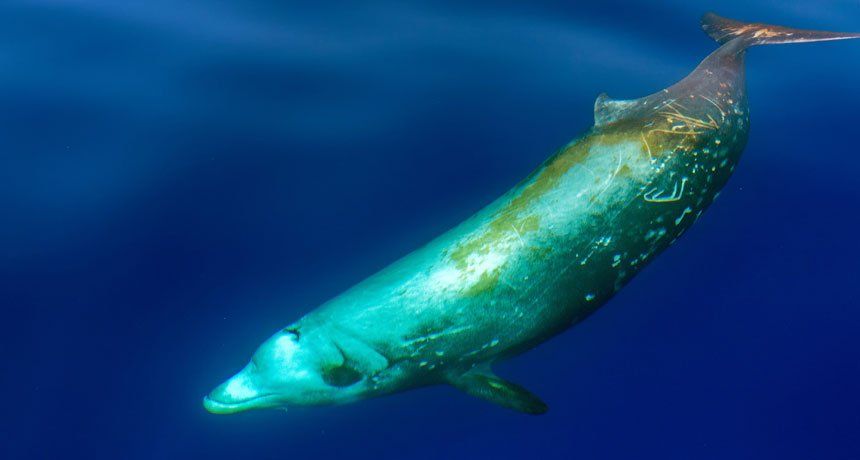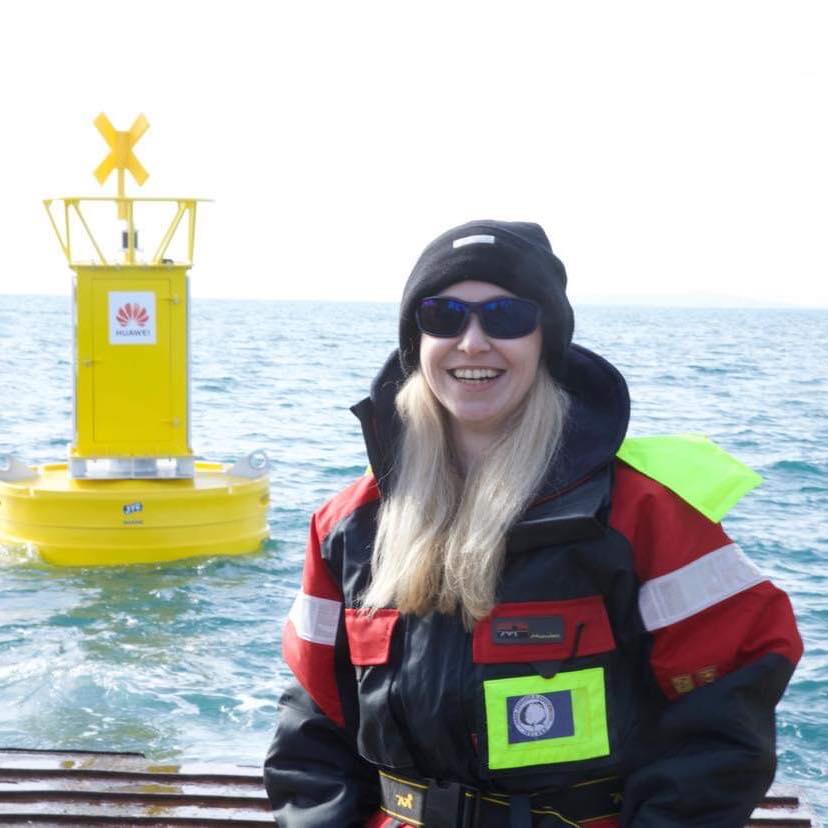BEAKED WHALES DIVE TOGETHER BUT FORAGE APART!
EMER KEAVENEY | JANUARY 10TH 2021.
Cooperative social foraging techniques can benefit echolocating animals, such as deep diving beaked whales who could eavesdropping on one another, however, they may also face problems of acoustic interference and intra-specific competition for prey.
A new study published in the
Royal Society of Publishing has investigated the potential advantaged and dis-advantages of co-operative foraging in two deep diving beaked whale species, Blainville's (
Mesoplodon densirostris ) and Cuvier's beaked whales (
Ziphius cavirostris ). Both species are well documented to perform highly synchronous group dives, as a presumed predator-avoidance, but until now, little was known about the cost-benefit relationship of this on foraging.
Cetaceans (whales, dolphins and porpoise) are highly social animals, as living in a group can provide a range of benefits, such as lowered predation risks or increased foraging efficiency. However, living in groups may involve costs, such as group competition for resources, or sensory interference of acoustic, visual or chemical cues used for group co-ordination or to find food.
Acoustic signals used for communication often have long durations with limited directionality, and so are more vulnerable to interference from other vocalising animals in the group. For example, when the acoustic signals overlap in time and frequency, signal interference may occur, ultimately affecting communication, hunting or habitat exploration. On the other hand, many toothed whale species exhibit powerful foraging echolocation clicks can be short lived (10- 250 μs ) and be directional and less susceptible to interference.
Some species of bats and dolphins avoid interference, by changing the frequency, amplitude and/or timing of their echolocation signals or increase their silent period while foraging, a strategy known as "jamming avoidance response" . Despite the potential for interference, many benefits have been associated with echolocating in a group, especially if individuals can eavesdrop on acoustic signals from foraging conspecifics in the group, such as rapid click sequences known as buzzes which are produced as an animal approaches its prey. Eavesdropping has been suggested as a strategy of wild killer whales (Orcinus orca) and bottlenose dolphins (
Tursiops truncatus ).
The foraging trade-offs for social deep diving whales such as beaked whales, involve capturing enough prey and nutrients on physiologically limited dives to compensate for energy expended on reaching their prey source. Blainville's and Cuvier′s beaked whales produce echolocation clicks to forage in light-limited deep waters and conduct highly coordinated foraging dives in small social groups, increasing the chance and impact of acoustic interference and/or competition.
Both beaked whale species exhibit close temporal coordination of their foraging dives and this coordination has been suggested to increase survival by reducing predation risk from killer whales. This is because diving coordination enables beaked whales to ascend from deep vocal dives in silence and with a random direction, and thus, surface in unpredictable locations some 1 km from their last vocal position and allows them to avoid being detected by predators such as killer whales. It may be the case that the potential of interference and overlap of echolocation signals is the price they pay to ensure protection by remaining in a group.
Scientists have analysed the acoustic activity of Blainville's and Cuvier's beaked whales echolocating in groups to try to understand how these cetaceans manage the above trade-offs of group foraging. They found that although beaked whales coordinate their echolocation-based foraging periods in tight groups, their individual click and buzz rates were both independent of the number of whales in the group. Meaning, their foraging performance was not affected by intra-group competition or interference from group members, and they did not appear to capitalise directly on eavesdropping on the echoes produced by the echolocation clicks of their companions. The study concluded that the close diving and vocal synchronisation of beaked whale groups that quantitatively reduces predation risk has little impact on foraging performance.
Reference:
Alcázar-Treviño J, JohnsonM, Arranz P, Warren VE, Pérez-González CJ,Marques T, Madsen PT, Aguilar de Soto N.2021 Deep-diving beaked whales dive togetherbut forage apart. Proc. R. Soc. B 288:20201905.
https://doi.org/10.1098/rspb.2020.1905















